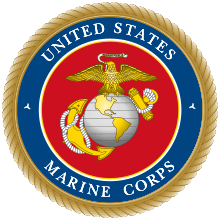16th Antiaircraft Artillery Battalion
The 16th Antiaircraft Artillery Battalion (16th AAA Bn) was a United States Marine Corps antiaircraft unit that served during World War II. Formed in 1942 as the 16th Defense Battalion, its original mission was the air and coastal defense of advanced naval bases. During the war the battalion defended Johnston Island, Hawaii and Tinian and took part in combat operations at Okinawa. The battalion returned to the United States after the war and was decommissioned on 30 November 1945 at Marine Corps Base Camp Pendleton, California.
| 16th Antiaircraft Artillery Battalion | |
|---|---|
| Active | |
| Country | |
| Branch | |
| Type | Air Defense/Coastal Defense |
| Size | ~800 men |
| Part of | V Amphibious Corps |
| Engagements | World War II *Battle of Okinawa |
| Commanders | |
| Current commander | N/A |
| Notable commanders | Richard P. Ross Jr. |
History
Organization
- Headquarters and Service Battery
- Light tank platoon
- Searchlight Batteries
- Seacoast Artillery Group
- Group Headquarters
- 2 x 155mm Gun Batteries
- AAA Group
- Group Headquarters
- 3 x 90mm Gun batteries
- Special Weapons Group
- Group Headquarters
- 40mm Battery battery (w/ 12 guns)
- 20mm Antiaircraft Gun Battery
- .50cal Antiaircraft Machine Gun Battery
The 16th Antiaircraft Artillery Battalion was commissioned on 10 November 1942 at Johnston Island. Personnel and equipment for the new battalion came from the re-designation of the Marine Defense Force, Naval Air Station Johnston Island. The battalion remained at Johnston Island providing air defense until 22 March 1944 when it was transferred to Kauai, Territory of Hawaii. Not all of the battalion departed Johnston Island as approximately 450 personnel remained for defensive purposes.[1]
As the war progressed, the Marine Corps removed coastal artillery from the defense battalions in order to form additional heavy artillery units for the Fleet Marine Force.[4] Because of the divestiture of the coastal defense mission, the battalion was re-designated as the 16th Antiaircraft Artillery Battalion on 19 April 1944. For the next few months, the battalion had to grow back to regular strength and continue training. On 11 November 1944, the battalion was transferred to the 1st Provisional Antiaircraft Artillery Group prior to deploying for combat operations in the Western Pacific.
Okinawa
The battalion departed Hawaii on 26 December 1944 aarriving at Tinian where it set up camp and gun positions. On 12 March 1945, the assault echelon of the battalion departed Tinian and sailed towards Okinawa, Japan for the upcoming amphibious landing. The assault echelon disembarked naval shipping on 8 April 1945. The rest of the battalion arrived in a number of different waves during May 1945. During the Battle of Okinawa the 16th AAA Battalion was one of four AAA battalions that comprised the 1st Provisional AAA Group.[5] During the battle they were emplaced near Yontan Airfield in order to protect the airfield against Japanese air raids and kamikaze attacks. .[6] Two Marines from the battalion were killed in action during the battle and another thirty two were wounded in action.[7] The battalion remained on Okinawa providing air defense until 20 September 1945.
Decommissioning
On 22 October, personnel of the 16th AAA Battalion embarked on the USS Meriwether (APA-203) and sailed for the United States. The battalion arrived at San Diego, California on 8 November 1945. On 27 November 1945 the 16th Antiaircraft Artillery Battalion was decommissioned.[4]
Notable members
- Gil Hodges - first basemen for the Brooklyn/Los Angeles Dodgers and manager for the New York Mets.[8]
Unit awards
A unit citation or commendation is an award bestowed upon an organization for the action cited. Members of the unit who participated in said actions are allowed to wear on their uniforms the awarded unit citation. The 16th Antiaircraft Artillery Battalion has been presented with the following awards:
| Streamer | Award | Year(s) | Additional Info |
|---|---|---|---|
| Presidential Unit Citation Streamer | 17 April - 14 July 1945 | Okinawa | |
| Asiatic-Pacific Campaign Streamer with one Bronze Star | Okinawa | ||
| World War II Victory Streamer | 1941–1945 | Pacific War |
See also
- Marine Defense Battalions
- List of United States Marine Corps aviation support units
Citations
- Rottman 2002, pp. 212.
- Rottman 2002, pp. 217.
- Rottman 2002, pp. 211.
- Rottman 2002, pp. 216.
- Rottman 2004, pp. 88.
- Nichols & Shaw 1955, pp. 200.
- Nichols & Shaw 1955, pp. 305.
- Clavin, Tom. (2013). Gil Hodges : the Brooklyn bums, the miracle Mets, and the extraordinary life of a baseball legend. Penguin Books. ISBN 0-451-23994-6. OCLC 798797291.
References
- Bibliography
- Nichols, Charles S., Jr.; Shaw, Henry I. (1955). Okinawa: Victory in the Pacific (PDF). United States Marine Corps Historical Branch.
- Rottman, Gordon L. (2002). U.S. Marine Corps World War II Order of Battle: Ground and Air Units in the Pacific War, 1939–1945. Greenwood Press. ISBN 0-313-31906-5.
- Rottman, Gordon L. (2004). US Marine Corps Pacific Theater of Operationss 1944-45. Osprey Press. ISBN 1841766593.
